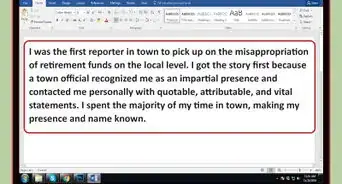This article was co-authored by Devin Jones. Devin Jones is the creator of “The Soul Career," an online career incubator for women. She is certified in the CliftonStrengths assessment and works with women to clarify their purpose and create meaningful careers. Devin received her BA from Stanford University in 2013.
There are 7 references cited in this article, which can be found at the bottom of the page.
wikiHow marks an article as reader-approved once it receives enough positive feedback. In this case, several readers have written to tell us that this article was helpful to them, earning it our reader-approved status.
This article has been viewed 59,254 times.
People often talk about the need for professionalism at work and even non-work situations. Professionalism means conducting yourself with responsibility, integrity, accountability, and excellence in anything you do. It also means that you can communicate effectively and appropriately and seek out ways to be productive.[1] You can develop professionalism by establishing your professional identity, observing the behavior of others, and participating in opportunities to demonstrate your own professionalism.
Steps
Establishing Your Professional Identity
-
1Start working on your professionalism early. Take every opportunity you can to figure out what other professionals expect of you. Then, show that you understand responsibility, teamwork, and basic ethical and moral value. This can help you figure out professionalism and may grab the attention of a mentor who can further develop your professionalism.[2]
- Ask questions any time you’re unsure of professional expectations. For example, “Mrs. Maier, how can I make the other teachers and students take me seriously when I give my presentation? I want to engage them and keep the mood light, but serious. I’m not sure how to do this. Can you please help me?”
-
2Be sensitive to time considerations. Show up for your responsibilities on time as much as possible. Stick to deadlines and submit your work when it’s due. If you’re going to be late for anything, let others know and offer a brief explanation of why. Being considerate of your time and that of others shows that you’re a professional and take your responsibilities seriously.[3]Advertisement
-
3Treat others with respect. Give every person with whom you have contact the same respect. Acknowledging that everyone is different and may have different circumstances than you can help you be a better team player and professional.[4]
-
4Follow ethical practices. Ethics are the moral standards that regulate right and wrong conduct in professional and personal settings. Use your best understanding of ethical behavior and practices at work and beyond. Ask questions of superiors, colleagues, friends, and even bosses if you are unsure of how best to apply ethical principles to situations you may encounter.[5] Each profession has specific ethical regulations, but some common ethical principles to follow for developing professionalism include:[6]
- Complying with established standards and procedures
- Performing duties with objectivity, due diligence, and professional care
- Serving in the interest of all parties involved in a lawful manner
- Maintaining privacy and confidentiality of information when applicable
- Continuing education for your work
-
5Play nice with colleagues. Teamwork is another essential element of developing professionalism. Take the time to figure out how you work best with each of your colleagues and how they best collaborate with one another. Understanding these relationships can promote healthy teamwork and positive relationships with colleagues.[7]
-
6Work on your communication skills. Foster open discussions and dialogue in any professional or personal environment. Ensuring that communications are transparent and respectful between yourself and others from support staff to superiors shows your professionalism. It always demonstrates your willingness to develop professionalism in yourself and others.
-
7Self-reflect to solve problems. Be ready to meet problems with effective solutions. Draw upon your other professional skills of teamwork, open communication, and following ethical practices to reach solutions. Self-reflecting by asking yourself the following questions can help you further solve problems:[8]
- What was my role in the problem?
- What can I do to correct my role?
- How can contribute to finding a solution by myself and with others?
- What did I learn from this experience and how can I apply it in the future?
Observing the Professional Behavior of Others
-
1Watch for examples of unprofessionalism. Just as professionalism is easy to see, unprofessional behaviors are as well. Pay attention to behaviors that other people exhibit that gets negative attention from you and others. Apply the lessons you learned from seeing unprofessionalism to ensure that your professional development continues on a positive path.[9] Some signs of unprofessionalism you may encounter include:[10]
- Crossing sexual boundaries
- Breaching confidentiality
- Proselytizing or haranguing to change people’s minds
- Failing to listen to others
- Billing or payment fraud
- Misrepresenting yourself
- Being under the influence of drugs and alcohol
- Abusing power[11]
-
2Dress for your environment. Watch how friends, colleagues, or others dress themselves where you are. Observing dress can give you an idea of what is appropriate and inappropriate attire. Ensure that you are also clean and neat, which enhances your efforts to dress the part and develop your professionalism.[12]
-
3Work with a mentor. Ask your school, university or employer if they have mentoring programs. You can also ask a person who you think exhibits consummate professionalism. Meet with this person regularly to discuss situations you encounter and how to deal with them. Ask questions about continuing to work on your professional development and how best to go about it without stepping on anyone’s toes.[13]
Developing Competency and Specialized Knowledge
-
1Acknowledge where your obligations lie. Being responsible—to yourself and others— is one of the cornerstone qualities of professionalism.[14] Figure out whom or what you’re being professional and doing your work for. Understanding where and with whom your responsibilities lie can help you act ethically and professionally in any situation.[15]
- For example, your obligations may lie with what your boss tells you to do. In other cases, such as with lawyers or doctors, your obligation may be to the public and your profession and not your employer.
-
2Act independently. Do your work by yourself as much as you can. Ask for help when you need it to complete required activities or work. Avoid giving up or passing your responsibilities on to others, which is unprofessional and may leave a negative impression of you.[16]
-
3Continue your education and training. Make an effort to go beyond regular expectations for your job by committing to lifelong learning. Enroll in continuing education classes or programs in your specific field. Staying on top of the latest developments can help you go above and beyond and also shows your commitment to being a professional.[17]
-
4Take away lessons from mistakes. Everyone makes mistakes in their jobs. Take your mistakes and turn them into valuable lessons about how to act and do things in the future. Being able to accept responsibility and critique for mistakes and learn from them is one of the many qualities of a professional.[18]
- Ask your supervisor or colleagues on how you might move on and improve from mistakes.
- Evaluate yourself and your performance on a regular basis. Consult a selection of your work and see where you made mistakes and can improve.
Expert Q&A
-
QuestionHow do you define "professionalism?"
 Devin JonesDevin Jones is the creator of “The Soul Career," an online career incubator for women. She is certified in the CliftonStrengths assessment and works with women to clarify their purpose and create meaningful careers. Devin received her BA from Stanford University in 2013.
Devin JonesDevin Jones is the creator of “The Soul Career," an online career incubator for women. She is certified in the CliftonStrengths assessment and works with women to clarify their purpose and create meaningful careers. Devin received her BA from Stanford University in 2013.
Career Coach I think professionalism means being respectful of an organization's culture and expectations, then representing yourself in the best way possible with those in mind. I think it looks different in every country and company. But it's about being aware of your environment and respectful of the culture you're in
I think professionalism means being respectful of an organization's culture and expectations, then representing yourself in the best way possible with those in mind. I think it looks different in every country and company. But it's about being aware of your environment and respectful of the culture you're in
References
- ↑ https://www.dol.gov/odep/topics/youth/softskills/Professionalism.pdf
- ↑ https://www.ncbi.nlm.nih.gov/pubmed/16627321
- ↑ https://philosophia.uncg.edu/phi361-matteson/module-3-social-responsibility-professionalism-and-loyalty/professional-responsibility/
- ↑ https://philosophia.uncg.edu/phi361-matteson/module-3-social-responsibility-professionalism-and-loyalty/professional-responsibility/
- ↑ http://www.iep.utm.edu/ethics/
- ↑ https://www.isaca.org/Certification/Code-of-Professional-Ethics/Pages/default.aspx
- ↑ https://www.dol.gov/odep/topics/youth/softskills/Professionalism.pdf
- ↑ https://www.dol.gov/odep/topics/youth/softskills/Professionalism.pdf
- ↑ https://www.dol.gov/odep/topics/youth/softskills/Professionalism.pdf
- ↑ http://www.oregon.gov/omb/board/philosophy/Pages/Professionalism.aspx
- ↑ http://www.oregon.gov/omb/board/philosophy/Pages/Professionalism.aspx
- ↑ https://www.dol.gov/odep/topics/youth/softskills/Professionalism.pdf
- ↑ http://coloradomentoring.org/wp-content/uploads/2013/09/Hamilton-N-Fostering-Professionalism-through-Mentoring-Journal-of-Legal-Education-Vol.-57-No.-1-March-2007.pdf
- ↑ https://philosophia.uncg.edu/phi361-matteson/module-3-social-responsibility-professionalism-and-loyalty/professional-responsibility/
- ↑ https://philosophia.uncg.edu/phi361-matteson/module-3-social-responsibility-professionalism-and-loyalty/professional-responsibility/
- ↑ https://philosophia.uncg.edu/phi361-matteson/module-3-social-responsibility-professionalism-and-loyalty/professional-responsibility/
- ↑ http://www.oregon.gov/omb/board/philosophy/Pages/Professionalism.aspx
- ↑ http://www.oregon.gov/omb/board/philosophy/Pages/Professionalism.aspx












































































